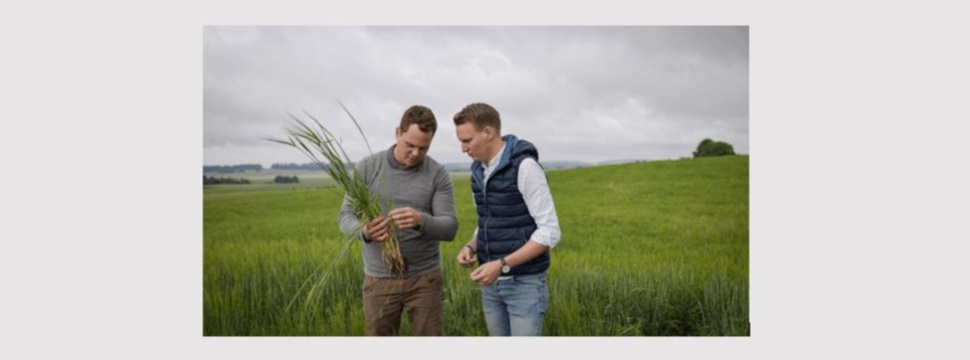One percent of turnover: Lammsbräu is the first company to pay farmers for services for the common good
News General news
- Payment for services for the common good complements fair raw material prices
- Lammsbräu farmers receive up to three times more for their services than conventional farmers

The organic pioneer Neumarkter Lammsbräu is now taking the next innovative step on the road to the agricultural turnaround: From the next cultivation period, the long-established company will be paying the more than 180 farmers in its steadily growing producer association for organic brewing raw materials (EZÖB) for their services to the common good. Lammsbräu spends one percent of its annual turnover of 31.7 million euros (calendar year 2023) on this. This makes the Upper Palatinate brewery the first company in Germany to reward farmers directly in monetary terms for the services they provide free of charge in addition to producing food for the general public. These services include the long-term protection of water, wildlife and soil on over 75,000,000 square meters in the region, which EZÖB's organic farmers ensure with their organic farming methods and the associated effort.
Johannes Ehrnsperger, owner and Managing Director of Neumarkter Lammsbräu: "From now on, we will not only pay the farmers for the raw materials they supply, but also for the services they provide to society.
In doing so, we are taking a holistic view of agricultural value creation and initiating the agricultural turnaround in a crucial area. On the one hand, we are concerned with making this visible. Unfortunately, it is not only in the public debate that it is often forgotten that organic farmers do more than just produce the best food. Through their organic farming practices, they also preserve nature and protect it for all of us - even for people who are not yet convinced of the benefits of organic farming. On the other hand, we believe that this extra effort should also be worthwhile for the farmers and should not just be appreciated with a pat on the back. That is why we are now rewarding these efforts directly with one percent of our turnover, thus creating additional incentives for farmers to switch to organic farming methods."
The payment for services for the common good that has now been launched complements the fairly calculated raw material prices that Lammsbräu has traditionally paid to its EZÖB farmers. These prices, which are set jointly for five years at a time, are not primarily based on the prices on the anonymous international commodity exchanges. Instead, they are primarily geared towards the actual needs of regional organic farmers so that they can operate well and pass on their farms to future generations in a sustainable manner.
For example, PPPI farmers receive up to 20 percent more for their raw materials than other organic farmers and even up to 200 percent more than conventional farmers. The payment of public welfare benefits is now a further plus for the EZÖB farmers. This secures farms that have converted to organic in the long term and practically counteracts the rampant extinction of farms. Karl Stephan, Chairman of the EZÖB: "The payment of public welfare services is the next milestone in our cooperation on an equal footing, which has now been successfully practiced for three and a half decades. The results of this fair and trust-based cooperation already speak for themselves: Lammsbräu receives the best organic raw materials for its beverages, we EZÖB farmers receive reliable and appreciative payment and together we continue to advance organic farming and nature conservation in the region. In our view, this is an extraordinary success story that over 180 farms have now joined for good reason."
The basis for calculation: the measured added value for society The basis for their payment is the ongoing recording and detailed scientific evaluation of all public welfare services already provided by the more than 180 EZÖB farms in the previous year.
An online tool that has been tried and tested at Lammsbräu since 2022 and is constantly being refined is used, which is currently based on around 500 key figures. Among other things, organic farmers are asked about the form of fertilization or the origin of feed. Topics such as job quality and regional networking also play a role. The result is an individual "sustainability score "4 for each EZÖB farm, which provides information about the corresponding commitment of the organic farmers and helps determine the level of remuneration for the respective farm. For example, if a farm performs above average, it receives a disproportionately higher amount of the funds spent by Lammsbräu as an additional reward for its commitment, which are otherwise divided equally among the participating farms regardless of the quantity supplied.
The data collection and evaluation procedure was developed and tested in two pilot studies carried out together with Regionalwert-Leistungen, in which the data of 16 and then 27 exemplary selected farms of the EZÖB were recorded.
The central results were:
- The 27 organic farms in the second pilot study generated public goods benefits totaling 1,442,707 euros per year. In relation to the agricultural area used, this corresponds to around 750 euros per hectare.
- The average public value added per organic farm of the EZÖB amounted to 53,434 euros. The average sustainability level was around 70 percent.
- The average sustainability performance per farm was 40,479 euros in the area of ecology, 4,091 euros in the area of social affairs and 8,863 euros in the area of regional economy.
- The pilot studies showed that the largest farms do not automatically achieve the greatest public benefit. Smaller companies in particular often made a disproportionately high contribution.
Johannes Ehrnsperger: "The data is impressive: if you conservatively extrapolate the results of our pilot studies to our entire EZÖB, this results in a value of around 10 million euros, which benefits the general public free of charge. That's quite a lot. And if you apply the results to all 36,535 organic farms in Germany, we are talking about around 1.95 billion euros a year that organic farmers donate to us all. We want to give something back in appreciation and you can actively support this with every crate of Lammsbräu."










